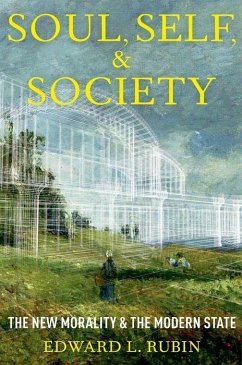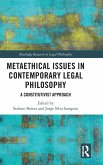- Gebundenes Buch
- Merkliste
- Auf die Merkliste
- Bewerten Bewerten
- Teilen
- Produkt teilen
- Produkterinnerung
- Produkterinnerung
Morality is not declining in the modern world. Instead, a new morality is replacing the previous one. Centered on individual self-fulfillment, and linked to administrative government, it permits things the old morality forbid, like sex for pleasure, but forbids things the old morality allowed, like intolerance and equality of opportunity.
Andere Kunden interessierten sich auch für
![Die Staufischen Kaiserwahlen Und Die Entstehung Des Kurfürstentums: Forschungen Von Hermann Bloch Die Staufischen Kaiserwahlen Und Die Entstehung Des Kurfürstentums: Forschungen Von Hermann Bloch]() Hermann BlochDie Staufischen Kaiserwahlen Und Die Entstehung Des Kurfürstentums: Forschungen Von Hermann Bloch40,99 €
Hermann BlochDie Staufischen Kaiserwahlen Und Die Entstehung Des Kurfürstentums: Forschungen Von Hermann Bloch40,99 €![Else Voigtländer: Self, Emotion, and Sociality Else Voigtländer: Self, Emotion, and Sociality]() Else Voigtländer: Self, Emotion, and Sociality97,99 €
Else Voigtländer: Self, Emotion, and Sociality97,99 €![Exploring the Self, Subjectivity, and Character Across Japanese and Translation Texts Exploring the Self, Subjectivity, and Character Across Japanese and Translation Texts]() Senko K MaynardExploring the Self, Subjectivity, and Character Across Japanese and Translation Texts144,99 €
Senko K MaynardExploring the Self, Subjectivity, and Character Across Japanese and Translation Texts144,99 €![Metaethical Issues in Contemporary Legal Philosophy Metaethical Issues in Contemporary Legal Philosophy]() Metaethical Issues in Contemporary Legal Philosophy181,99 €
Metaethical Issues in Contemporary Legal Philosophy181,99 €![Self, System and the Non-Conscious Self, System and the Non-Conscious]() Laurence PeddleSelf, System and the Non-Conscious21,99 €
Laurence PeddleSelf, System and the Non-Conscious21,99 €![Ackee For The Soul, Life Lessons from Xaymaca - Jamaica Ackee For The Soul, Life Lessons from Xaymaca - Jamaica]() Andrew MalcolmAckee For The Soul, Life Lessons from Xaymaca - Jamaica15,99 €
Andrew MalcolmAckee For The Soul, Life Lessons from Xaymaca - Jamaica15,99 €![Nature, the Soul, and God: An Introduction to Natural Philosophy Nature, the Soul, and God: An Introduction to Natural Philosophy]() Jean W. RiouxNature, the Soul, and God: An Introduction to Natural Philosophy50,99 €
Jean W. RiouxNature, the Soul, and God: An Introduction to Natural Philosophy50,99 €-
-
-
Morality is not declining in the modern world. Instead, a new morality is replacing the previous one. Centered on individual self-fulfillment, and linked to administrative government, it permits things the old morality forbid, like sex for pleasure, but forbids things the old morality allowed, like intolerance and equality of opportunity.
Hinweis: Dieser Artikel kann nur an eine deutsche Lieferadresse ausgeliefert werden.
Hinweis: Dieser Artikel kann nur an eine deutsche Lieferadresse ausgeliefert werden.
Produktdetails
- Produktdetails
- Verlag: Hurst & Co.
- Seitenzahl: 502
- Erscheinungstermin: 13. März 2015
- Englisch
- Abmessung: 238mm x 177mm x 36mm
- Gewicht: 776g
- ISBN-13: 9780199348657
- ISBN-10: 0199348650
- Artikelnr.: 47871021
- Herstellerkennzeichnung
- Libri GmbH
- Europaallee 1
- 36244 Bad Hersfeld
- gpsr@libri.de
- Verlag: Hurst & Co.
- Seitenzahl: 502
- Erscheinungstermin: 13. März 2015
- Englisch
- Abmessung: 238mm x 177mm x 36mm
- Gewicht: 776g
- ISBN-13: 9780199348657
- ISBN-10: 0199348650
- Artikelnr.: 47871021
- Herstellerkennzeichnung
- Libri GmbH
- Europaallee 1
- 36244 Bad Hersfeld
- gpsr@libri.de
Edward Rubin grew up in Brooklyn, N.Y., received his undergraduate degree from Princeton and his law degree from Yale. He clerked on the Second Circuit, briefly practiced entertainment law, and joined the Berkeley Law School faculty in 1982. He move to Penn Law School in 1988 and then to Vanderbilt Law School in 2005, where he served as Dean. As an educator, Rubin has championed curricular reform; as a scholar, he has authored numerous books, articles and edited volume, many devoted to the reform and modernization of legal institutions.
* Introduction
* The Thesis
* An Illustration: The 2012 Election
* Plan of the Book
* The Boundaries and Limits of the Thesis
* Part I: Origins of the New Morality
* Chapter 1: The Morality of Honor
* The Privatization of Government in the Roman Empire The Privatization
of Governance in Early Medieval Europe The Morality of Honor and the
Man of Honor
* The Man of Honor in Action The Morality of Honor and Other Members of
Society
* The Co-Causal Connection
* Chapter 2: The Morality of Higher Purposes
* The Publification of Governance
* The Monarchy as a Higher Purpose of Its People and Government
* The Spiritualization of Christianity
* The Morality of Higher Purposes
* Sexual Love as a Higher Purpose
* The Co-Causal Connection
* Chapter 3: The Morality of Self-Fulfillment
* The Idea of the Administrative State
* The Advent of the Administrative State
* Self-Fulfillment Morality: The Process of Secularization
* Self-Fulfillment Morality: The Concept of Mental Health
* The Co-Causal Connection
* Resistance to the New Morality
* Part II: The Nature of the New Morality
* Chapter 4: The Morality of the Self
* The Basic Principle: The Self as a Life-Path
* The Basic Principle: Fulfillment as Pleasure, Planning and Reflection
* Secondary Principles: Non-Interference, Incommensurability and
Equality
* Components of the Life Path: Careers
* Components of the Life-Path: Family, Religion and Leisure
* The End of the Life-Path
* Chapter 5: The Morality of Intimate and Personal Relations
* The Validation of Sex
* The Reformulation of Childhood Sex
* The Deregulation of Sex
* The Domestication of Love
* The Personalization of Parenthood
* The Personalization of Friendship and the Officialization of Work
* Chapter 6: The Morality of Relations with Society
* The Self's Relation to the Nation-State
* The Morality of Self-National Relations
* The Non-Interference Principle and Negative Rights
* The Equality Principle and Positive Rights
* Moral Action Beyond Voting: Reiteration and Emergent Consequences
* The New Morality and Environmentalism
* Conclusion: The Future of Christianity
* Christianity and Western History (Chapters 1, 2 and 3)
* Christianity and the New Morality of the Self (Chapter 4)
* Christianity and the New Morality of Personal Relations (Chapter 5)
* Christianity and the New Morality of Relations with Society (Chapter
6)
* A Final Word
* The Thesis
* An Illustration: The 2012 Election
* Plan of the Book
* The Boundaries and Limits of the Thesis
* Part I: Origins of the New Morality
* Chapter 1: The Morality of Honor
* The Privatization of Government in the Roman Empire The Privatization
of Governance in Early Medieval Europe The Morality of Honor and the
Man of Honor
* The Man of Honor in Action The Morality of Honor and Other Members of
Society
* The Co-Causal Connection
* Chapter 2: The Morality of Higher Purposes
* The Publification of Governance
* The Monarchy as a Higher Purpose of Its People and Government
* The Spiritualization of Christianity
* The Morality of Higher Purposes
* Sexual Love as a Higher Purpose
* The Co-Causal Connection
* Chapter 3: The Morality of Self-Fulfillment
* The Idea of the Administrative State
* The Advent of the Administrative State
* Self-Fulfillment Morality: The Process of Secularization
* Self-Fulfillment Morality: The Concept of Mental Health
* The Co-Causal Connection
* Resistance to the New Morality
* Part II: The Nature of the New Morality
* Chapter 4: The Morality of the Self
* The Basic Principle: The Self as a Life-Path
* The Basic Principle: Fulfillment as Pleasure, Planning and Reflection
* Secondary Principles: Non-Interference, Incommensurability and
Equality
* Components of the Life Path: Careers
* Components of the Life-Path: Family, Religion and Leisure
* The End of the Life-Path
* Chapter 5: The Morality of Intimate and Personal Relations
* The Validation of Sex
* The Reformulation of Childhood Sex
* The Deregulation of Sex
* The Domestication of Love
* The Personalization of Parenthood
* The Personalization of Friendship and the Officialization of Work
* Chapter 6: The Morality of Relations with Society
* The Self's Relation to the Nation-State
* The Morality of Self-National Relations
* The Non-Interference Principle and Negative Rights
* The Equality Principle and Positive Rights
* Moral Action Beyond Voting: Reiteration and Emergent Consequences
* The New Morality and Environmentalism
* Conclusion: The Future of Christianity
* Christianity and Western History (Chapters 1, 2 and 3)
* Christianity and the New Morality of the Self (Chapter 4)
* Christianity and the New Morality of Personal Relations (Chapter 5)
* Christianity and the New Morality of Relations with Society (Chapter
6)
* A Final Word
* Introduction
* The Thesis
* An Illustration: The 2012 Election
* Plan of the Book
* The Boundaries and Limits of the Thesis
* Part I: Origins of the New Morality
* Chapter 1: The Morality of Honor
* The Privatization of Government in the Roman Empire The Privatization
of Governance in Early Medieval Europe The Morality of Honor and the
Man of Honor
* The Man of Honor in Action The Morality of Honor and Other Members of
Society
* The Co-Causal Connection
* Chapter 2: The Morality of Higher Purposes
* The Publification of Governance
* The Monarchy as a Higher Purpose of Its People and Government
* The Spiritualization of Christianity
* The Morality of Higher Purposes
* Sexual Love as a Higher Purpose
* The Co-Causal Connection
* Chapter 3: The Morality of Self-Fulfillment
* The Idea of the Administrative State
* The Advent of the Administrative State
* Self-Fulfillment Morality: The Process of Secularization
* Self-Fulfillment Morality: The Concept of Mental Health
* The Co-Causal Connection
* Resistance to the New Morality
* Part II: The Nature of the New Morality
* Chapter 4: The Morality of the Self
* The Basic Principle: The Self as a Life-Path
* The Basic Principle: Fulfillment as Pleasure, Planning and Reflection
* Secondary Principles: Non-Interference, Incommensurability and
Equality
* Components of the Life Path: Careers
* Components of the Life-Path: Family, Religion and Leisure
* The End of the Life-Path
* Chapter 5: The Morality of Intimate and Personal Relations
* The Validation of Sex
* The Reformulation of Childhood Sex
* The Deregulation of Sex
* The Domestication of Love
* The Personalization of Parenthood
* The Personalization of Friendship and the Officialization of Work
* Chapter 6: The Morality of Relations with Society
* The Self's Relation to the Nation-State
* The Morality of Self-National Relations
* The Non-Interference Principle and Negative Rights
* The Equality Principle and Positive Rights
* Moral Action Beyond Voting: Reiteration and Emergent Consequences
* The New Morality and Environmentalism
* Conclusion: The Future of Christianity
* Christianity and Western History (Chapters 1, 2 and 3)
* Christianity and the New Morality of the Self (Chapter 4)
* Christianity and the New Morality of Personal Relations (Chapter 5)
* Christianity and the New Morality of Relations with Society (Chapter
6)
* A Final Word
* The Thesis
* An Illustration: The 2012 Election
* Plan of the Book
* The Boundaries and Limits of the Thesis
* Part I: Origins of the New Morality
* Chapter 1: The Morality of Honor
* The Privatization of Government in the Roman Empire The Privatization
of Governance in Early Medieval Europe The Morality of Honor and the
Man of Honor
* The Man of Honor in Action The Morality of Honor and Other Members of
Society
* The Co-Causal Connection
* Chapter 2: The Morality of Higher Purposes
* The Publification of Governance
* The Monarchy as a Higher Purpose of Its People and Government
* The Spiritualization of Christianity
* The Morality of Higher Purposes
* Sexual Love as a Higher Purpose
* The Co-Causal Connection
* Chapter 3: The Morality of Self-Fulfillment
* The Idea of the Administrative State
* The Advent of the Administrative State
* Self-Fulfillment Morality: The Process of Secularization
* Self-Fulfillment Morality: The Concept of Mental Health
* The Co-Causal Connection
* Resistance to the New Morality
* Part II: The Nature of the New Morality
* Chapter 4: The Morality of the Self
* The Basic Principle: The Self as a Life-Path
* The Basic Principle: Fulfillment as Pleasure, Planning and Reflection
* Secondary Principles: Non-Interference, Incommensurability and
Equality
* Components of the Life Path: Careers
* Components of the Life-Path: Family, Religion and Leisure
* The End of the Life-Path
* Chapter 5: The Morality of Intimate and Personal Relations
* The Validation of Sex
* The Reformulation of Childhood Sex
* The Deregulation of Sex
* The Domestication of Love
* The Personalization of Parenthood
* The Personalization of Friendship and the Officialization of Work
* Chapter 6: The Morality of Relations with Society
* The Self's Relation to the Nation-State
* The Morality of Self-National Relations
* The Non-Interference Principle and Negative Rights
* The Equality Principle and Positive Rights
* Moral Action Beyond Voting: Reiteration and Emergent Consequences
* The New Morality and Environmentalism
* Conclusion: The Future of Christianity
* Christianity and Western History (Chapters 1, 2 and 3)
* Christianity and the New Morality of the Self (Chapter 4)
* Christianity and the New Morality of Personal Relations (Chapter 5)
* Christianity and the New Morality of Relations with Society (Chapter
6)
* A Final Word








